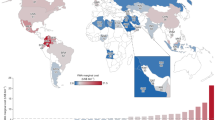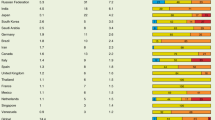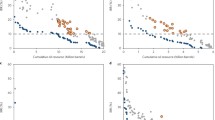Abstract
Crude oil is not a homogenous commodity. Light sweet crude oils produce a high percentage of products desired by consumers after distillation. Other crude oils (heavy, sour, or high-sulfur crude) must be heavily processed to obtain needed products. The failure to understand the differences between desirable light crudes and heavy sour crude oils can lead to bad forecasts of market behavior. Using a stylized model of the market, I show that tightening environmental regulations in the absence of adequate refining capacity to process heavy sour crude puts upward pressure on crude prices and explains the 2008 price increase. The upward pressure is exacerbated by the monopolist practices of heavy sour crude producers, who set price differentials to maximize income. This model also can be used to analyze the impact of the supplies lost from Libya in 2011.







Similar content being viewed by others
Notes
The problems with this theory, which in ways hark back to the Catholic Church's fifteenth-century geocentric view of the universe, are discussed below.
Petroleum Economics Monthly, May 2008, p. 10.
References
Argus Global Media, 2008. “Argus Global Markets,” (June 30).
Broder, John M., and Clifford Krauss . 2011. “Oil Reserves Are Tapped to Offset Libyan Loss.” The New York Times, (June 24).
Fattouh, Bassam . 2011. “An Anatomy of the Crude Oil Pricing System (WPM40),” The Oxford Institute for Energy Studies, January.
Hamilton, James D. 2009. “Causes and Consequences of the Oil Shock of 2007–2008,” in Brookings Papers on Economic Activity, edited by David Romer and Justin Wolfers. The Brookings Institution, Washington, DC: Spring, pp. 215–267.
International Energy Agency, 2009. “Medium Term Oil Market Report,” (June).
International Energy Agency, 2011a. “Oil Market Report,” (April).
International Energy Agency, 2011b. “Oil Market Report,” (July).
International Monetary Fund, 2011. World Economic Outlook (April).
Killian, Lutz . 2009. “Not All Oil Price Shocks Are Alike: Disentangling Demand and Supply Shocks in the Crude Oil Market.” American Economic Review, 99 (3): 1053–1069.
Petroleum Intelligence Weekly, 2008 April 28.
Smith, James L . 2009. “World Oil: Market or Mayhem? Journal of Economic Perspectives, 23 (3): 145–164.
Verleger Jr., Philip K . 1982. “The Determinants of Official Oil Prices.” The Review of Economics and Statistics, 64 (2): 177–183.
Webster's New Twentieth Century Dictionary, 1968 Merriam-Webster.
Additional information
*Philip K. Verleger, Jr. is the Owner and President of PKVerleger LLC and is the David E. Mitchell/EnCana Professor of Management at the University of Calgary's Haskayne School of Business. He writes and publishes The Petroleum Economics Monthly. He began his work on energy as a consultant to the Ford Foundation Energy Policy Project in 1972. He then served as a Senior Staff Economist on President Ford's Council of Economic Advisers and Director of the Office of Energy Policy at the U.S. Treasury in President Carter's administration. He has been a Senior Research Scholar and Lecturer at the School of Organization and Management at Yale University, a Vice President in the Commodities Division at Drexel Burnham Lambert, and a Senior Fellow at the Institute for International Economics. Verleger earned his Ph.D. in Economics from MIT in 1971.
Rights and permissions
About this article
Cite this article
Verleger, P. Rising Crude Oil Prices: The Link to Environmental Regulations. Bus Econ 46, 239–248 (2011). https://doi.org/10.1057/be.2011.29
Published:
Issue Date:
DOI: https://doi.org/10.1057/be.2011.29




